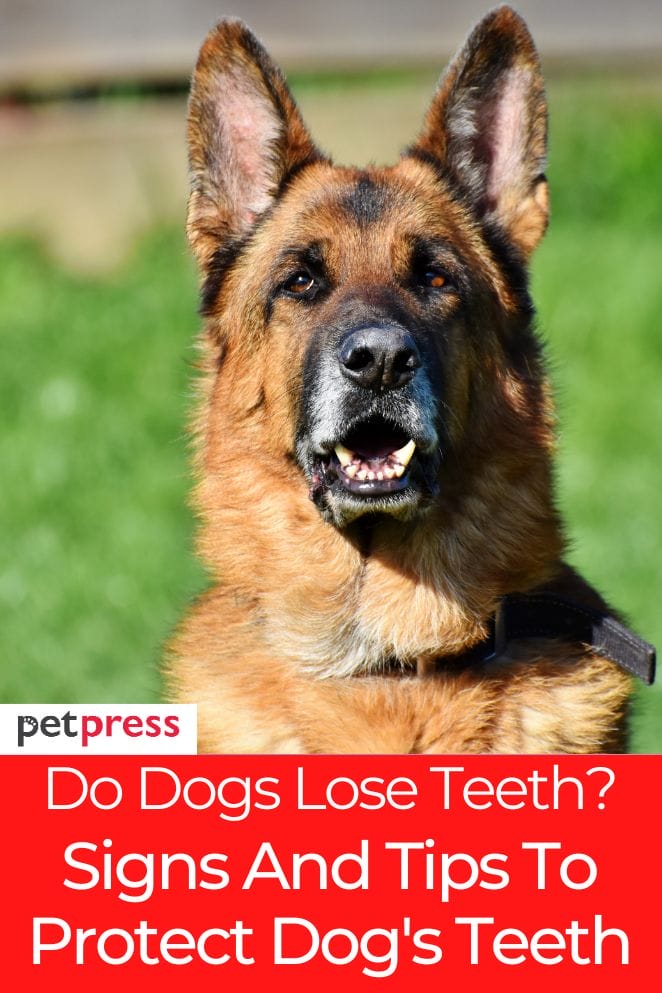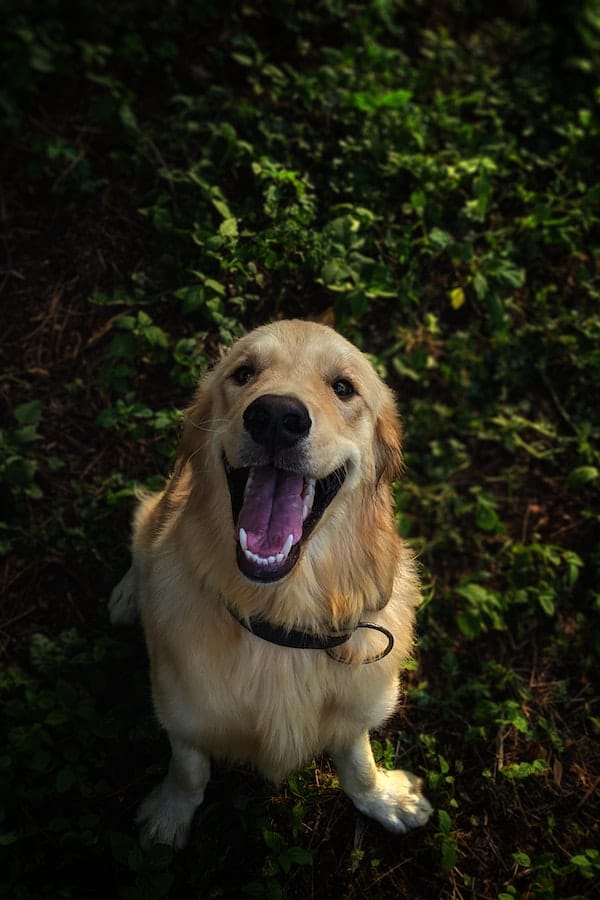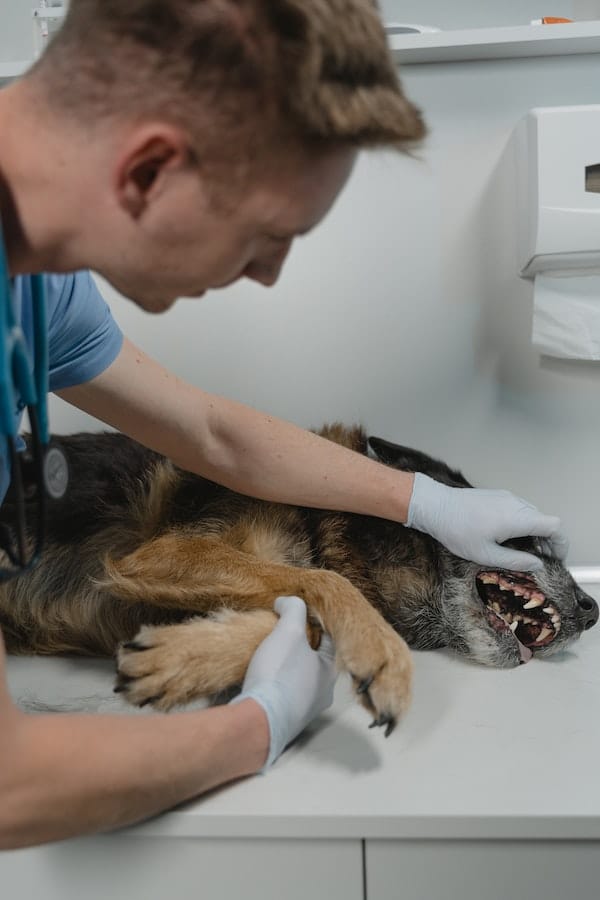
Owners of adult dogs may be surprised to find that their pet can lose teeth.
Adult canine tooth loss is a normal event in life and is usually not indicative of any underlying health issue.
Knowing the common causes and how to manage them can help keep your pup healthy and comfortable throughout their life.
In this article, we’ll explore why dogs can lose teeth, the signs and symptoms that might indicate a need for veterinary care, and what owners can do to protect their pet’s dental health.
Why do dogs lose teeth?

Adult dogs can start to lose teeth for a variety of reasons, including:
Dental disease
One of the most common causes of canine tooth loss is dental disease.
Poor oral hygiene can lead to plaque and tartar build-up on the teeth, which can cause gum inflammation, infection and eventually tooth decay.
If left untreated, infected teeth may need to be extracted by a veterinarian.
Periodontal disease
Periodontal disease is a serious problem in dogs and can lead to tooth loss.
Periodontal disease is caused by bacteria that infect the gums and cause inflammation, leading to changes in the underlying bone structure of the teeth.
If left untreated, periodontal disease can result in loose or lost teeth.
Trauma
Trauma can also cause tooth loss in adult dogs.
Fractures, dental avulsions (teeth being knocked out), and other injuries to the teeth or jaw can all lead to tooth loss.
In most cases, trauma-related tooth loss is sudden and can be accompanied by pain and bleeding from the affected area.
Age-related loss
As dogs age, they can start to lose teeth due to wear and tear.
Teeth may become loose or fall out as the gums recede due to age-related changes in the underlying dental structure.
This type of tooth loss typically occurs gradually and is not accompanied by pain or bleeding.
What are the signs of tooth loss in dogs?

Owners should keep an eye out for the following signs and symptoms that could indicate tooth loss in their dogs:
Bad breath and drooling
Bad breath and drooling can be signs of dental disease or periodontal disease and should always be checked by a veterinarian.
Difficulty eating
If your dog is having difficulty eating, it may have lost a tooth or have a fractured tooth that needs to be addressed.
Difficulty chewing can also indicate gum inflammation, infection, or even a problem with the jaw.
Red, swollen gums
If your dog’s gums are red and swollen, it could be a sign of infection or advanced dental disease. Swelling can also indicate an abscess or tooth root problem that needs to be addressed.
How to protect your dog’s dental health?

There are several steps owners can take to help protect their pup’s dental health and reduce the risk of tooth loss:
Regular brushing
Regular brushing is one of the best ways to protect your pup’s teeth and gums from plaque and tartar build-up.
Owners should brush their pet’s teeth at least twice a week with an enzymatic toothpaste made specifically for dogs.
Dental checkups
It’s important to take your pup for regular dental check-ups with a veterinarian.
During these visits, the vet can assess your pet’s oral health and address any potential issues before they become major problems.
Dental treats
Giving your pup dental treats is another way to help protect their teeth and gums from plaque and tartar build-up.
Look for treats that are specifically designed to reduce plaque and tartar, as well as freshen their breath.
Proper diet and nutrition
A balanced diet and proper nutrition can also help protect your pup’s oral health.
Make sure they are getting the right vitamins and minerals, as well as plenty of water to stay hydrated.
Chews and toys for appropriate chewing
Providing your pup with appropriate chew toys and treats can help keep their teeth clean and healthy.
It’s important to choose toys that are specifically designed for chewers, as some can be too hard or sharp and lead to broken teeth or other dental issues.
When to see a veterinarian?

There are many signs that could indicate dental problems in your pup, and they should always be checked out by a veterinarian.
If you notice any of the following signs, it’s important to seek veterinary care right away:
Signs of infection or injury
Signs of infection or injury include red, swollen gums; pain when chewing; bad breath; excessive drooling; and difficulty eating.
If your pup is exhibiting any of these signs, it’s important to take them to the vet right away for a check-up and appropriate treatment.
Unexplained loss of teeth
Unexplained loss of teeth can also be a sign that something is wrong. If you notice your pup losing teeth suddenly, take them to the vet for an assessment.
The cause could be anything from trauma to dental disease, and it’s important to get it checked out as soon as possible.
Other symptoms of illness
Other symptoms of illness, such as decreased appetite, vomiting, or weight loss, can also be indicative of a dental problem.
If your pup is exhibiting any of these signs in combination with the above symptoms, it’s important to take them to see a vet immediately for an examination.
Conclusion
Losing teeth is a very serious issue that can lead to infection, pain, and other serious health problems for your pup.
It’s important to be aware of the signs of tooth loss in dogs so you can take action right away to help protect their oral health.
Regular brushing, dental check-ups, proper diet and nutrition, and providing appropriate chew toys can all help reduce the risk of tooth loss.
If you notice any of the signs mentioned above, it’s important to seek veterinary care right away. With proper care, your pup will be happy and healthy for many years to come.
- Does Cat Litter Melt Ice? The Complete Guide to Winter Safety - January 30, 2026
- Happy Tail Dogs: Understanding This Common Canine Condition - January 29, 2026
- How Cold Can Outdoor Cats Handle? Feline Winter Safety - January 27, 2026


GIPHY App Key not set. Please check settings